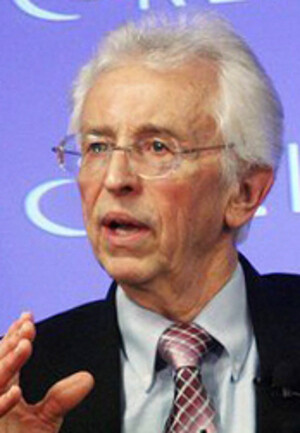hankyoreh
Links to other country sites 다른 나라 사이트 링크
Nuclear scientist says North Korean nukes years away from threatening the US

By Park Hyun, Washington correspondent
A leading US nuclear expert said North Korea's recent nuclear test was "successful," producing roughly double the force of the blast recorded after its second test in 2009.
Siegfried Hecker, a professor at Stanford University, gave his opinion in an email interview published on his website, saying the test exhibited the typical characteristics of an underground nuclear explosion with seismic waves of 5.0 to 5.1 on the Richter scale. http://cisac.stanford.edu/news/hecker_takes_hard_look_at_north_koreas_nuclear_test_20130214/
According to Hecker, the 2009 test generated two to seven kilotons of force. This means that his estimate of the latest blast's force ranged between four to fourteen kilotons, up to twice as much as the six to seven estimated by the South Korean Ministry of National Defense.
While he noted that South Korea and China had failed to detect any radioactive particles after the test, Hecker also said there was a strong possibility that North Korea opted to detonate a highly enriched uranium (HEU) device in its latest test. As a reason for this, he noted that the country's foreign ministry talked about a "qualitative increase in the nuclear deterrent" when announcing the test last month. Because of its limited stores of plutonium, an HEU weapon would be the only way of achieving this.
Hecker also said the aim of the test was to develop the technology to miniaturize a nuclear weapon.
"This test may have given them the confidence to [make a sufficiently small and lightweight weapon] for one of their shorter-range missiles," he wrote.
However, he also said North Korea was "many years away" from threatening the American continent.
In the interview, Hecker said the test took North Korea "one more step closer to possessing a missile-deliverable nuclear weapon" and suggested it would "expand its arsenal by stepping up production of HEU."
With its increased confidence in the deterrent value of its arsenal, he added, North Korea may become more provocative and aggressive toward South Korea, the US, and Japan.
Hecker concluded that the biggest impact of the nuclear test was that it would "signal that the Kim Jong-un regime, like its predecessors, has chosen bombs over electricity."
Normalizing relations, signing a peace treaty, and achieving economic development would become "much more difficult, if not impossible, for at least the next five years," he added.
Please direct questions or comments to [english@hani.co.kr]

Editorial・opinion
![[Column] Samsung’s ‘lost decade’ and Lee Jae-yong’s mismatched chopsticks [Column] Samsung’s ‘lost decade’ and Lee Jae-yong’s mismatched chopsticks](https://flexible.img.hani.co.kr/flexible/normal/500/300/imgdb/original/2024/0512/3017154788490114.jpg) [Column] Samsung’s ‘lost decade’ and Lee Jae-yong’s mismatched chopsticks
[Column] Samsung’s ‘lost decade’ and Lee Jae-yong’s mismatched chopsticks![[Correspondent’s column] The real reason the US is worried about Chinese ‘overcapacity’ [Correspondent’s column] The real reason the US is worried about Chinese ‘overcapacity’](https://flexible.img.hani.co.kr/flexible/normal/500/300/imgdb/original/2024/0510/5217153290112576.jpg) [Correspondent’s column] The real reason the US is worried about Chinese ‘overcapacity’
[Correspondent’s column] The real reason the US is worried about Chinese ‘overcapacity’- [Editorial] Yoon’s gesture at communication only highlights his reluctance to change
- [Editorial] Perilous stakes of Trump’s rhetoric around US troop pullout from Korea
- [Guest essay] Preventing Korean Peninsula from becoming front line of new cold war
- [Column] The state is back — but is it in business?
- [Column] Life on our Trisolaris
- [Editorial] Penalties for airing allegations against Korea’s first lady endanger free press
- [Editorial] Yoon must halt procurement of SM-3 interceptor missiles
- [Guest essay] Maybe Korea’s rapid population decline is an opportunity, not a crisis
Most viewed articles
- 1[Column] Samsung’s ‘lost decade’ and Lee Jae-yong’s mismatched chopsticks
- 2[Correspondent’s column] The real reason the US is worried about Chinese ‘overcapacity’
- 3S.K.-Japan joint history project to be revived
- 4Seoul’s plan to adopt SM-3 missiles is like wanting a sledgehammer to catch a fly
- 5Behind bellicose bluster, N. Korea is turning airfields into greenhouse farms
- 6Yoon rejects calls for special counsel probes into Marine’s death, first lady in long-awaited presse
- 7[Book review] Who said Asians can’t make some good trouble?
- 8Samsung heiress Lee Bu-jin divorces husband
- 9Report documents instances of lonely deaths in South Korean society
- 10Yoon’s broken-compass diplomacy is steering Korea into serving US, Japanese interests